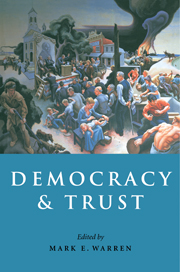Book contents
- Frontmatter
- Contents
- List of figures
- List of tables
- List of contributors
- Acknowledgments
- 1 Introduction
- 2 Do we want trust in government?
- 3 How can we trust our fellow citizens?
- 4 Trust, well-being and democracy
- 5 Democracy and social capital
- 6 Liberty against the democratic state: on the historical and contemporary sources of American distrust
- 7 Trust, voluntary association and workable democracy: the contemporary American discourse of civil society
- 8 Trust and its surrogates: psychological foundations of political process
- 9 Geographies of trust, geographies of hierarchy
- 10 Altruistic trust
- 11 Democratic theory and trust
- 12 Conclusion
- Index
3 - How can we trust our fellow citizens?
Published online by Cambridge University Press: 15 March 2010
- Frontmatter
- Contents
- List of figures
- List of tables
- List of contributors
- Acknowledgments
- 1 Introduction
- 2 Do we want trust in government?
- 3 How can we trust our fellow citizens?
- 4 Trust, well-being and democracy
- 5 Democracy and social capital
- 6 Liberty against the democratic state: on the historical and contemporary sources of American distrust
- 7 Trust, voluntary association and workable democracy: the contemporary American discourse of civil society
- 8 Trust and its surrogates: psychological foundations of political process
- 9 Geographies of trust, geographies of hierarchy
- 10 Altruistic trust
- 11 Democratic theory and trust
- 12 Conclusion
- Index
Summary
Trust is more than just another interesting, difficult, though only recently widely studied social phenomenon. The current rise in interest in this phenomenon (as reflected in recent writings by, among others, Fukuyama (1995), Seligman (1992), Gambetta (1988), Giddens (1990), Levi (1996), Misztal (1996), Putnam (1993), and Eisenstadt (1995, 1998)) as well as the closely related group of phenomena such as social capital, respect, recognition, confidence, associability, social cohesion, and civil society may have to do with a widely shared, though largely implicit, diagnosis of basic problems of public policy and the steering of social coordination, and ultimately the maintenance of social order itself. Specialists in the field of sociology of knowledge will have to reflect upon why it is that these perennial questions of social theory are widely addressed today in terms of such “soft” conceptual tools referring to informal and subinstitutional social phenomena. But there cannot be much doubt that cognitive frames and moral dispositions that prevail at the grass roots level of social life are perceived by many social theorists to be a kind of bottleneck variable upon which the viability of institutions is thought to be contingent.
What I take to be the underlying intuition that conditions the current rise in the interest in trust and related phenomena can be explicated as a skeptical three-step argument.
First, the social order of modern society is reproduced through a mix of three major media of coordination. Money serves to coordinate the action of market participants.
- Type
- Chapter
- Information
- Democracy and Trust , pp. 42 - 87Publisher: Cambridge University PressPrint publication year: 1999
- 271
- Cited by



